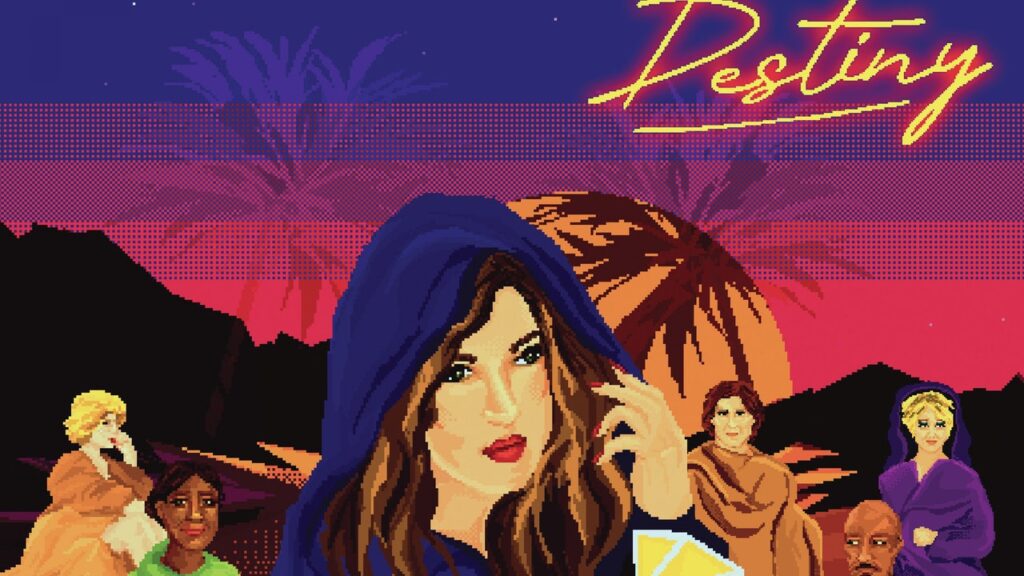
Somewhere between a brain massage and a 1990s basement rave, a memory and a dream, lies the curious and sparkling realm of DJ Sabrina the Teenage DJ. Since her 2017 debut Makin’ Magick, the prolific, pseudonymous London producer (who sometimes works with a collaborator, Salem) has built out a world of lush deep house that interweaves disco, synth funk, and Radio Disney pop with breakbeats, dialogue samples, and power-ballad vocals. At nearly four hours long, her new album Destiny is her most intricate project yet, a radiant and elastic celebration of the transportive possibilities of dance music.
DJ Sabrina’s name and much of her cheeky 64-bit promotional imagery draw from the comic-book-turned-’90s-sitcom Sabrina the Teenage Witch, which followed 16-year-old Sabrina Spellman’s earnest attempts to balance life as a powerful sorceress and a Britney Spears-loving high schooler. DJ Sabrina chose her namesake because she felt it conveyed a certain melancholy aesthetic, like a “warped TV movie that makes you cry in a way no mainstream movie would be able to,” she explained to Bandcamp in 2021. Her 2020 album, Charmed, won over pandemic-weary online fans, some of whom swore that Sabrina’s music had eased their depression. Porter Robinson, the similarly pop-minded American producer, started spinning her tracks between sets. In 2022, a demo that she’d sent to the 1975 became the basis for the band’s song “Happiness.”
Since then, Sabrina has remained semi-anonymous and cooking. She dropped two albums on the same day in 2021: the darker, more industrial The Other Realm, and a sequel to Makin’ Magick. 2022’s Bewitched, which sounds crafted by a plucky teen cyborg, further established her signature sound. Instead of taking wider attention as a cue to package her output for ease of mass consumption, Sabrina has pushed its limits: Why not dabble in witch house while also taking inspiration from The Marshall Mathers LP 2? Why not rerelease each new project in a “singles” edition—which presents individual tracks rather than a continuous mix—and encourage fans to exploit the structural and stylistic flexibility of playlisting?
That eagerness to experiment with form is abundantly evident in the vast medley of genres Sabrina incorporates into Destiny: smooth jazz, 2010s EDM, country, crunk. Standout “Invincible (Something to Hold on To)” blends clanging synths and vocoder samples into a dreamy, menacing club thumper that brings an electric tingle to Destiny’s sometimes impenetrable-seeming digital sheen. You like “In the Air Tonight”? Sabrina does too, and proudly alerts us by letting loose a waterfall of Phil Collins-inspired drums near the end of “Vibrations.” Even the bouncy rock-rap on “For Now and Forever” works, indicating the generous breadth of Sabrina’s internal playlist of raw material. In her universe, Prince and Barenaked Ladies are both permitted to rock.
The album’s various vocal samples are subplots of a story painted in the hues of all Sabrina’s favorite jams. Before these voices disappear into cascades of synth or saxophone, they serve up glimpses of bittersweet, often sanguine scenes that feel plucked from a ’00s weeknight slot on the late CW network: choosing to bet on long-distance love, pushing through “nights that end in heartache,” taking on the vulnerable work of “figuring it out.” Like conversations overheard outside the uncanny valley’s hottest club, personal dramas sharpen into view and then fade, a blurry but poignant cinema of everyday life.
The word “nostalgia” has often been used to pinpoint the effect of Sabrina’s evocative blends. But her varied influences—from the obvious (The Avalanches, Daft Punk, ABBA) to the less so (Bon Iver, Reba McEntire)—and surreal imagery don’t reflect a wistfulness exclusive to any particular decade or scene. Less than a sense of time, Sabrina’s nostalgia revels in the word’s emotional connotations: the ambient sense of sadness that is the grand condition of experiencing joy. She understands profoundly that sometimes the best party is just the first one in a while that’s truly fun.
This nostalgia associated with no one time or place is the fulcrum of Destiny, the achievement that earns the album its spot in the “crying on the dancefloor” bracket. In Sabrina’s amorphous, melodramatic world, compositions unfold like sunsets, vivid and impermanent—even a four-hour album doesn’t last forever. Daunting as its length may appear, Destiny is less an Odyssey than a “most romantic moments” YouTube compilation: easy to dip in and out of, because the payoffs just keep coming. Let it wash over you, and Destiny conjures a rare kind of immediate, cup-filling catharsis.
